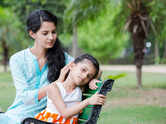01/6How to raise loving siblings?

Sibling relationships are full of bittersweet moments. It is a bond that is unbreakable and beautiful. However, sometimes, it can take a wrong turn - something even bigger than just a sibling fight. Now, this does not mean bickering over small issues like who gets to pick the presents first or who has the remote control or who gets to sit in the front car seat, but something even greater.
Parents often overlook when one of their children is being mean and rude to the other, believing it to be a 'just another childhood quarrel'. However, that's not it. If you see sibling disagreements taking an abusive route, then it's time to intervene.
Also read: Try these tricks+foods to boost your child's memory
02/6What is sibling rivalry?


Sibling rivalry is something that is very common between siblings. It describes an ongoing conflict or disagreement between kids raised in the same family, irrespective of whether they are blood-related or cousins or adopted.
It involves verbal or physical fighting, name-calling, bickering, being competitive or displaying a sense of jealousy.
There is no exact cause of a sibling rivalry. Sometimes it's long term, for others, it resolves over time and when children hit an age of maturity. But sibling rivalry is most often manageable and can be handled by parents, who are almost always the peacemakers.
03/6How is sibling rivalry different from bullying?


There is a very thin line between sibling rivalry and sibling bullying, which is why parents often fail to see the red flags. But it is important to note that the two are very different from one another. While sibling rivalry sometimes dwells on negative emotions, it is not long term and does not intend on hurting the other.
Bullying is totally different. It involves aggression, use of force, hurtful teasing or even threat, abusive language, and intimidation. Sibling bullying can have all these characteristics. The quarrels and the fights may be more regular, the teasing is almost always meant to hurt and if one child's behaviour is altering another child's behaviour, then parents must intervene immediately.
04/6Why is it NOT just another childhood memory?


For kids, their home is their safe haven. People who live with them should always give them a sense of safety and security. But if they're being bullied at home by their own sibling, which means if they're being verbally or physically abused, threatened, intimidated, it can take a toll on the child's mind. Not the kind of childhood memory you would want for your child... would you?
This is even worse because unlike other people, who are strangers, siblings know everything about each other, which gives them sufficient pointers to hurl at each other. A bullying sibling will almost always use that to their advantage.
05/6When do parents need to intervene?


If your child is bullied by another child, you will most likely intervene immediately, addressing the problem. However, if one of your own kids is being mean to the other, you're likely to brush it away and may not step in at all. That's when it may send the wrong message to your child.
Irrespective of who the bully is, parents must not support it, at home or anywhere else. Standing up for what is right will help model good behavior in kids. However, there are things you can do as a parent that can nip the problem in the bud. Read on to find out.
06/6What parents should do and avoid


When kids are young and still in their developing stages, parents hold the key to their personality. How your child grows up to be is almost entirely up to you. While certain environmental and societal factors do play a role, you have most of the power and control. That said, here are some things you can do to avoid any act of bullying in the house:
- Set clear rules and boundaries.
- Do not allow hitting, coercing and verbal abuse.
- Be a good role model and practice what you preach.
- Never compare your kids with each other or with their kids.
- Put an immediate end to any aggressive behavior shown by your kids.
- Teach empathy and kindness and make sure your children know the value of family.















































































closecomments
SIGN IN WITH
FacebookGoogleEmail